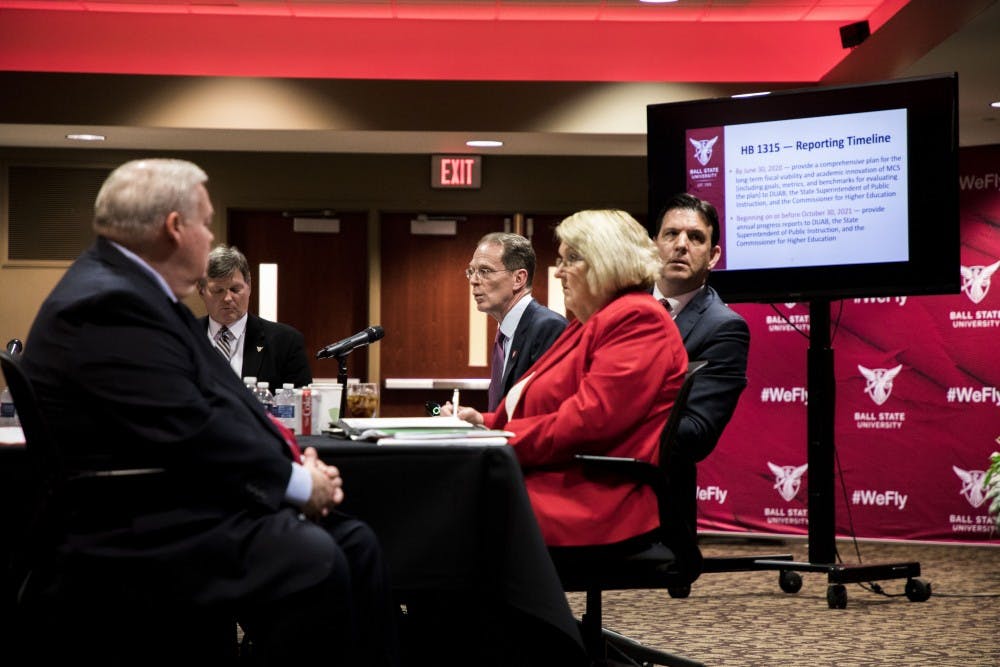Ball State’s Board of Trustees unanimously approved the initiative set forth by House Bill 1315 Wednesday, meaning Ball State has assumed the responsibility for Muncie Community Schools (MCS).
This decision comes after both the House and Senate passed HB 1315 Monday with votes of 63-30 and 34-14, respectively. Gov. Eric Holcomb signed the bill Tuesday.
Now, the Board of Trustees will be responsible for selecting five of the seven Muncie school board members. President Geoffrey Mearns will select the other two based off three recommendations from Muncie Mayor Dennis Tyler and three recommendations from Muncie City Council.
Mearns said during a board meeting Wednesday that while it is encouraged the board members hold residency within the district, it is not a requirement. Requirements include: they must be 21-years-old, they must be a U.S. citizen, they must have a GED or a high school degree, but preference is given to those with secondary degrees.
Applicants will be disqualified if they are a Ball State trustee or family of a Ball State trustee, if they are an employee or a family member of an employee of the Muncie school district or someone who has financial interest in the school system.
“But perhaps more important than those minimum qualifications are the skills and attributes that we desire in school board appointees. Those include a passion, a demonstrated passion, for the Muncie Community Schools, specifically a passion for public K-12 education,” Mearns said. “We also would look for people who have a record of civic engagement and community participation.”
Mearns said applicants may begin applying as soon as Thursday and applications will close within two weeks.
What happens next
The university and MCS will now go through a two year transition period starting July 1 and running through June 30, 2020. During that time, Mearns said the university will create a comprehensive plan in consultation with the Muncie community.
Starting July 1, the current emergency managers of MCS, Administrator Assistance, will help the new school board during a 60-day transition period, which is provided in the current contract with the Distressed Unit Appeals Board.
After those 60 days, the emergency manager will no longer be necessary, and the distress label the school is currently under will be lifted.
In addition to the school board appointments, Marilyn Buck, former interim provost and interim executive vice president of academic affairs, was appointed as the Ball State liason to MCS.
“I spent 12 years teaching when I first started my career, and then I spent the next 19 years essentially training teachers and working in the schools,” Buck said. “Now I have the opportunity to do that and use my leadership role at the university, and being able to understand the university structure and resources to put all those pieces together to help the university and the Muncie Community Schools to work as collaboratively together as we possibly can.”
Additionally, Mearns said the university will establish various committees to address enrollment decline, operating performance and academic performance.
The Board will have a little over a month to prepare for its official takeover July 1, but it has already began preparation, and a large part of that was seeking financial support.
Mearns said along with working toward securing a $12 million no-interest loan from the common school fund, the university would receive grant opportunities and various donations from the community totalling $2.95 million to put toward the initiative.
Of that $2.95 million, Mearns said $50,000 would be put toward a teachers resource fund so Muncie school teachers don’t have to pay out-of-pocket for classroom materials.
MCS staff also will receive a 50 percent scholarship to enroll in six credit hours a year and the same preferred pricing Ball State employees receive to attend athletic and entertainment events and the use of recreational facilities.
Additionally, Mearns said all returning employees would receive the same compensation and benefits in the next year and “virtually all current employees will continue to have the opportunity to be employed in the next academic year.”
“To all the members of the community, those here and those watching, you have my personal commitment that all of us here at Ball State will continue to work in partnership with you,” Mearns said. “We value your input, we need your wisdom and we share your aspirations for our children and for our city.”
Community concerns
While Mearns said the initiative has received a lot of support, it hasn’t always been that way. Various community members spoke up throughout the five-month process about their concerns with the bill, one of those being Muncie Mayor Dennis Tyler.
RELATED: HB 1315 leaves some questioning Ball State's next steps
“Ball State was never ever my concern,” Tyler said. “My concern was always the issue of losing an elected school board in the process — no mechanism being in place for returning the Muncie Community Schools to an elected body, the potential of the teachers losing their collective bargaining rights, the idea of Ball State not having to abide by certain training for teachers on job abuse and neglect and others.
“But in saying all that, now that the legislation has passed as it was written, I look forward to partnering with Ball State.”
Under the new legislation, Ball State would be exempt from receiving future A-F grades from the state. Nate Rose, a 2013 Ball State alumnus and future MCS parent, said he was not in support of the bill because it gives Ball State too much power.
“There are provisions in this bill that do not ever return control of Muncie schools to Muncie residents,” Rose said. “Now they talk about, you know, Ball State is local, but Ball State is not local. Ball State only represents Ball State.
“The wider Muncie community has been left out of this process. I find it very disingenuous that they talk about unity and they talk about coming together when up to this point in the process, there has been no contact between them and the community. This isn’t a partnership, this is a takeover.”
Current Muncie School Board member Jason Donati said that while he was unsure of the legislation, now that is has passed, the most important thing to do is unify and create a stable environment for the children.
“As a parent I’m nervous,” Donati said. “I think our kids are in a vulnerable place with this uncertainty and instability and it affects them in many different ways. We may not know for a year, so as quickly as we can come together and unify and make sure we have everything in order to assure stability in our school system is of the utmost importance right now.”
Contact Brooke Kemp with comments at bmkemp@bsu.edu or on Twitter @brookemkemp. Contact Brynn Mechem with comments at bamechem@bsu.edu or on Twitter @BrynnMechem.





